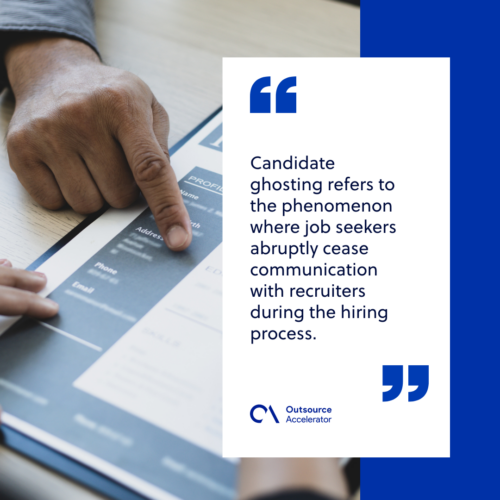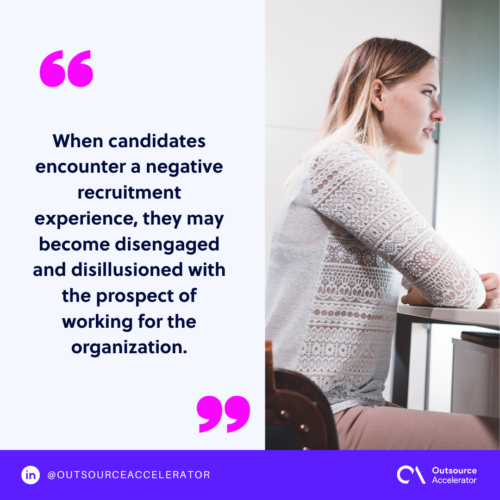Candidate ghosting: A quick guide for recruiters

It’s a frustrating experience for recruiters when candidates suddenly disappear without any explanation.
Why? Recruiters invest significant time and effort in engaging with potential candidates and progressing them through the hiring pipeline.
When candidates abruptly cease communication, recruiters are left in a state of limbo – unsure of whether to continue pursuing them or start a new process.
This sudden disappearance disrupts the flow of operations, delays hiring timelines, and can have cascading effects on the organization’s ability to meet its staffing needs effectively.
This article serves as a guide for hiring managers to understand what candidate ghosting is, why it happens, how to avoid it, and how to prevent it in the future.
What is candidate ghosting?
Candidate ghosting refers to the phenomenon where job seekers abruptly cease communication with recruiters during the hiring process. They often do this without providing any explanation or formal withdrawal.
This behavior can manifest at various stages of the recruitment journey, from initial application submissions to interviews and even after receiving a job offer.
Essentially, the candidate “disappears” from the recruitment process, leaving recruiters puzzled and frustrated by the sudden lack of response or follow-up.

Why are candidates ghosting recruiters?
Here are some of the common reasons why candidates end up ghosting hiring managers:
Multiple job opportunities
One reason why candidates may ghost a recruiter is the existence of multiple job opportunities.
When faced with multiple offers or promising leads, candidates may prioritize certain opportunities over others based on factors such as:
- Salary
- Benefits
- Company culture
- Location
- Career advancement potential
In such situations, applicants may feel compelled to focus their attention and efforts on the most appealing opportunities while deprioritizing or neglecting others.
Negative candidate experience
A negative candidate experience is one of the reasons for candidate ghosting. This includes a variety of factors like the following:
- Prolonged application processes
- Lack of communication or feedback from recruiters
- Impersonal interactions
- Dissatisfaction with the recruitment process
- Disappointment with the interview process
When candidates encounter a negative recruitment experience, they may become disengaged and disillusioned with the prospect of working for the organization.
This can lead them to question whether they want to continue investing time and effort in pursuing the opportunity.
An example is when a candidate submits an application and doesn’t receive any acknowledgment or updates from the recruiter for an extended period. The applicant may perceive this as a lack of interest from the company.

Passive approach
Passive approach as a reason for candidate ghosting occurs when individuals adopt a more passive stance in their job search process.
Instead of actively engaging with recruiters or proactively pursuing opportunities, candidates tend to take a more laid-back approach, often waiting for opportunities to come to them.
In this scenario, they may apply to multiple positions simultaneously without necessarily committing fully to any particular opportunity.
These individuals might not have a strong preference for any specific role, and their level of interest may vary depending on the offers they receive.
When a more desirable opportunity arises, candidates with a passive approach may choose to pursue it while neglecting to communicate their decision to recruiters from other organizations.
How to avoid candidate ghosting
While it may not be possible to eliminate candidate ghosting completely, recruiters can take steps to minimize its occurrence:
Streamline the hiring process
A lengthy and convoluted hiring process increases the likelihood of candidates ghosting.
Streamline the process by reducing the number of interview rounds, minimizing paperwork, and providing timely feedback.
Set clear expectations
From the initial contact with candidates, recruiters should communicate openly about the recruitment process timeline, stages, and what candidates can expect at each step.
This includes informing candidates about the expected duration between interviews, feedback timelines, and the overall hiring timeline.
Establish a specific timeline for updates
Recruiters create a sense of transparency and accountability that encourages continued engagement from candidates by establishing specific dates of the application status.
This approach helps to manage candidate expectations and reduces uncertainty, minimizing the likelihood of candidates ghosting out of frustration or ambiguity.
What to do when a candidate ghosts you
When a candidate suddenly cease communication during the hiring process, it can be frustrating and disruptive to your recruitment efforts.
Here are some steps you can take:
- Follow up. Try reaching out to the candidates via email or phone to check in and inquire about their status or if the applicant is still interested in pursuing the position.
- Send a polite reminder. If you haven’t heard back after your initial follow-up, consider sending a polite reminder email or making another phone call. Reiterate your interest in their application and ask if they need any additional information or clarification.
- Move on. If you still haven’t received a response after multiple attempts to contact the candidate, it may be time to move on and focus your efforts on other applicants.

Preventing future candidate ghosting
To prevent future instances of candidate ghosting, consider implementing the following strategies:
- Prioritize creating a positive and respectful experience for candidates throughout the hiring process.
- Regularly solicit feedback from candidates about their experience with your recruitment process.
- Invest time in building relationships with candidates, even those who ultimately aren’t selected for the position.
By cultivating a positive candidate experience and building strong relationships, you can create a recruitment process that attracts top talent and fosters mutual respect and communication.
It would also help to enlist professional services. You may check out Connext Global Solutions for recruitment and staffing assistance.







 Independent
Independent




